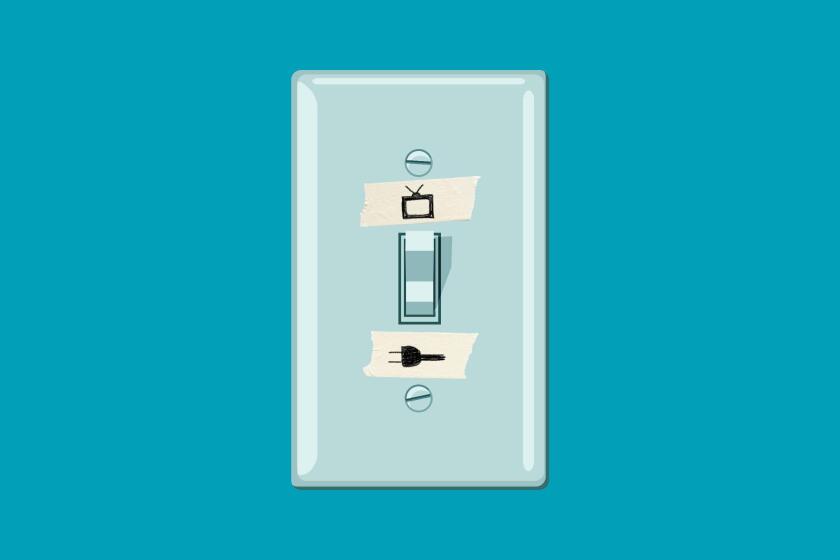Cable giant Charter to buy Cox in a $34.5-billion deal, uniting providers that serve SoCal

- Share via
- The proposed consolidation, announced Friday, comes as the industry grapples with accelerating cable customer losses amid the shift to streaming.
Charter Communications and Cox Communications plan to merge in a $34.5-billion deal that would unite Southern California’s two major cable TV and internet providers to sell services under the Spectrum brand.
The proposed consolidation, announced Friday, comes as the industry grapples with accelerating cable customer losses amid the shift to streaming.
The companies could face even more cord-cutting after their long-time programming partner, Walt Disney Co., begins offering its ESPN sports channel directly to fans in a stand-alone streaming service debuting this fall.
If approved by Charter shareholders and regulators, the merger would end one of the longest TV sports blackouts.
Cox customers in Rancho Palos Verdes, Rolling Hills Estates and Orange County would finally have the Dodgers’ TV channel available in their lineups. For more than a decade, Cox has refused to carry SportsNet LA because of its high cost.
Charter distributes the Dodgers channel as part of a $8.35-billion television contract signed with the team’s owners in 2013. Charter has bled hundreds of millions of dollars on that arrangement and now offers the channel more widely via a streaming app.
With sports leagues and teams experimenting with streaming amid an exodus from cable, fans are having problems accessing live sports programming.
The Atlanta-based Cox is the nation’s third-largest cable company with more than 6.5 million digital cable, internet, telephone and home security customers. Stamford, Conn.-based Charter has more than 32 million customers.
Charter dramatically expanded its Los Angeles presence in 2016 by acquiring Time Warner Cable for more than $60 billion.
The Charter-Cox combination would have 38 million customer homes in the country — a larger footprint than longtime cable leader, Philadelphia’s Comcast Corp.
“This transformational transaction will create an industry leader in mobile and broadband communication services and seamless video entertainment,” Charter Chief Executive Christopher Winfrey said in a conference call with analysts.
Winfrey would become the proposed entity’s CEO.
A major motivation for the deal was to be able to combine operations in Los Angeles, Orange and San Diego counties where both services currently operate and add attractive markets like Phoenix, Winfrey told analysts.
“Our network will span approximately 46 states passing nearly 70 million homes and businesses,” Winfrey said.
Cox is privately held. The billionaire Cox family, descendants of an Ohio press baron who bought his first newspaper in 1898, began acquiring cable systems in 1962 and has since held them with a tight grip. The Cox cable assets were long seen as a lucrative target.
Last year, Cox generated $13.1 billion in revenue and $5.4 billion in adjusted earnings before interest, taxes, depreciation and amortization.
“Cox was always the first name that would come up in consolidation conversations... and it was always the first name dismissed,” longtime cable analyst Craig Moffett wrote in a Friday research note. “Cox wasn’t for sale.”
Until it was.
In an unexpected twist, the name of the merged company would be changed to Cox within a year of the deal closing. However, its products would carry the Spectrum moniker.
The Cox family would be the largest shareholder, owning about 23% of the combined entity’s outstanding shares.
Charter shares got a slight bump on Friday’s news, climbing nearly 2% to $427.25.
“Cable is a scale business. [The] added size should help Charter compete better with the larger telcos, tech companies and [Elon Musk’s] Starlink,” said Chris Marangi, co-chief investment officer of value at the New York-based Gabelli Funds, a large media investor.
There are actually things to talk about in Hollywood other than the WGA and SAG-AFTRA strikes — such as the Disney-Charter deal to end the blackout.
Adding the Cox homes will allow Charter to expand distribution for its El Segundo-based Spectrum News channel.
Charter said it would absorb Cox’s commercial fiber, information technology and cloud businesses. Cox Enterprises agreed to contribute the residential cable business to Charter Holdings.
Cox Enterprises would be paid $4 billion in cash and receive about $6 billion in convertible preferred units, which could eventually be exchanged into Charter shares. The Cox family would get about 33.6 million common units in the Charter Holdings partnership, worth nearly $12 billion.
The combined entity will absorb Cox’s $12 billion in outstanding debt.
ESPN, ABC stations, FX and other Disney-owned channels are part of a high-stakes blackout affecting 14.8 million Charter Spectrum customer homes.
Charter’s ability to navigate the challenged landscape was a factor in the family’s decision, said Cox Enterprises Chief Executive Alex Taylor, a great-grandson of the company’s founder, told analysts.
“Charter has really impressed us above all others with the way they have spent capital,” Taylor said. “In the last five years, they’ve spent over $50 billion investing” in internet infrastructure and building a wireless phone service.
“This deal starts with mobile,” cable analyst Moffett wrote. “Cox is relatively late to the wireless game. But that only means that the opportunity in [the combined companies’] footprint is that much larger.”
The companies said they could wring about $500 million a year in annual cost savings.
The combined company would have about $111 billion of debt.
Four months after Charter Communications acquired Time Warner Cable, the company is officially retiring the much-maligned Time Warner Cable brand name.
Cox would have two directors on the 13-member board, including Taylor, who would serve as chairman.
Advance/Newhouse would keep its two board members. Advance/Newhouse would hold about 10% of the new company’s shares.
The transaction is expected to close at the same time as Charter’s merger with Liberty Broadband, which was approved by Charter and John Malone’s Liberty Broadband stockholders in February.
After the consolidation, Liberty Broadband will no longer be a direct Charter shareholder.
The Associated Press contributed to this report.
More to Read
Inside the business of entertainment
The Wide Shot brings you news, analysis and insights on everything from streaming wars to production — and what it all means for the future.
You may occasionally receive promotional content from the Los Angeles Times.















